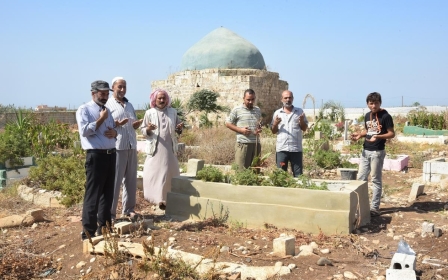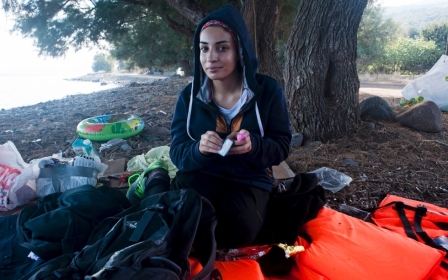Lebanon’s landscape of refugee despair
The view from the mental health room at the new Doctors Without Borders (MSF) clinic in the Lebanese town of Majdal Anjar showcases a scene typical of today’s Bekaa Valley. In the distance, a tented settlement housing refugees from Syria is featured against a mountainous backdrop, beyond which lies the Syrian city of Zabadani. This summer, battle sounds from the city reverberated across Majdal Anjar.
As we sit by the window, Tarek Baydoun - one of MSF’s volunteer mental health counselors - mentions an occasional fear that a stray missile will come flying over the mountain. (It wouldn’t be the first case of a direct hit on an MSF healthcare centre, that achievement having already been accomplished by the recent US airstrikes on the organisation’s hospital in Kunduz, Afghanistan.)
Indeed, for the estimated two million Syrian refugees currently residing in Lebanon, it’s been difficult to put much distance between themselves and the homeland - either physically or psychologically.
According to Baydoun, who often sees four or more patients per day, the most common psychological afflictions facing Syrian refugees involve depression and severe anxiety. In children, enuresis - or bedwetting - is a frequent manifestation of mental strife. The causes of mental troubles, Baydoun says, have to do not only with stressful and traumatic experiences accumulated in war-torn Syria but also with difficulties adjusting to the new reality in Lebanon, where refugees have been given a less-than-warm reception.
The close quarters into which many refugees are forced - with multiple families often inhabiting a single room or tent - are themselves incubators for stress. Add to that the abundance of cases in which refugees are unaware of the fate of a close family member. After the son of one of Baydoun's female patients disappeared in Syria, she spent two years in denial of his probable death. During her counselling sessions with Baydoun, the woman came to accept that, in order to facilitate her own eventual psychological recovery, she needed to view her son as definitively dead and thus allow the grieving process to take its course.
MSF’s mental health activity manager Rima Makki, who accompanied me to the Bekaa, added that this lack of information - the very fact of not knowing exactly what to cope with psychologically - can be “traumatic in itself”.
This is not to imply, obviously, that refugees don’t also have more straightforward issues with which they must cope. Case in point: two sisters-in-law I met at one of Majdal Anjar’s 25 tented settlements, where I was taken by Makki and another MSF worker who enjoyed a high level of camaraderie with the residents. The sisters-in-law fled to Lebanon from the Syrian city of Homs three years ago after being wounded by fragmentation bombs. The younger one shyly pulled up the sleeve of her shirt to reveal a patch of mangled skin.
The other woman, who had been pregnant at the time of the attack, held in her lap the product of the pregnancy: a giggly three-year-old daughter, clad in a worn out sweater with pictures of bears and the English words “winter clothes to hibernate”. Following the fragmentation bomb incident and the escape to Lebanon, the woman said, she’d found it nearly impossible to sleep and panicked at mundane sounds such as those made by cars - an inconvenient arrangement, to say the least, given the tented settlement’s location on the side of a road.
'We cannot see anything'
As Makki explained to me, part of MSF’s approach to mental health in the Bekaa is to collaborate with primary healthcare providers to reduce the frequency with which psychosomatic problems are incorrectly assumed to have purely organic rather than mental causes. Problems might include heart palpitations and shortness of breath, as well as bedwetting.
There are other factors, too, that impede the proper diagnosis and treatment of psychological issues, in Lebanon and beyond. These range from a lack of awareness of treatment options to the stigmatisation of psychological suffering, via which sufferers are made to believe that such perceived weakness is not societally acceptable. To that effect, MSF conducts awareness sessions both at its primary healthcare clinics in the Bekaa Valley and within the community itself, including in the tented settlements. In the Bekaa alone, MSF currently has four mental health programs in various stages of development.
It goes without saying, meanwhile, that the world in general could use an awareness session on the psychological side of the refugee crisis. The dearth of discussion about this subject might well have something to do with the fact that so many sectors of the global populace are loath to regard refugees as human beings in the first place.
When I asked one group of refugees in Majdal Anjar how they envisioned the future, a few of them put their hands over their eyes and said: “We cannot see anything.”
An older man at another tented settlement down the road noted the number of young people in the camp who, he said, were departing for Europe on “boats of death”. The risks of such passage were unimportant, according to his analysis, because the refugees saw themselves as practically dead already.
The refugees I talked with had nothing but praise for MSF’s operations - words of appreciation that did not extend to some of the other NGOs in the area, which, they said, often appeared to operate on a policy of feigned helpfulness.
So while there may be no cure in sight for the mass-scale despair that inevitably attends refugee crises, at least there are some palliatives.
- Belen Fernandez is the author of The Imperial Messenger: Thomas Friedman at Work, published by Verso. She is a contributing editor at Jacobin magazine.
The views expressed in this article belong to the author and do not necessarily reflect the editorial policy of Middle East Eye.
Photo: A tented settlement in the Bekaa Valley, Lebanon (MEE / Belen Fernandez)
Middle East Eye propose une couverture et une analyse indépendantes et incomparables du Moyen-Orient, de l’Afrique du Nord et d’autres régions du monde. Pour en savoir plus sur la reprise de ce contenu et les frais qui s’appliquent, veuillez remplir ce formulaire [en anglais]. Pour en savoir plus sur MEE, cliquez ici [en anglais].





